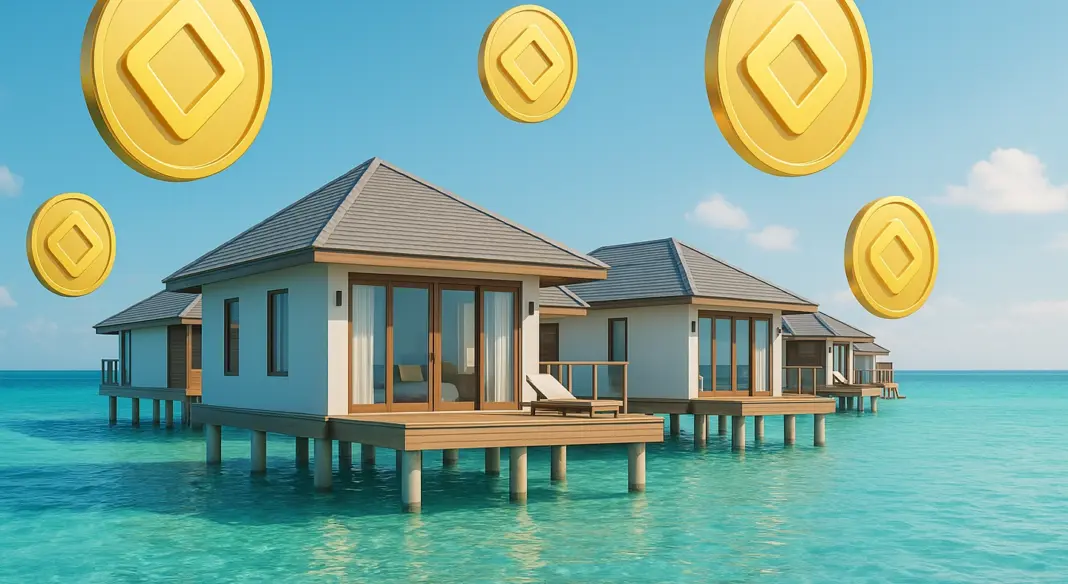Imagine pristine turquoise waters, white-sand beaches, and now — blockchain tokens.
Saudi real estate giant Dar Global is partnering with the Trump Organization to launch a luxury hotel development in the Maldives, and they’re doing it with a twist: the entire project is being tokenized.
Stay ahead in the crypto world – follow us on X for the latest updates, insights, and trends!🚀
Instead of buying a villa outright, investors will be able to purchase blockchain-backed tokens representing fractional ownership in the development.
It’s a new spin on real estate investing — one that blends traditional luxury branding with cutting-edge digital finance.
A tokenized path into luxury real estate
According to the official announcement, the Trump International Hotel Maldives will include roughly 80 ultra-luxury beach and overwater villas, with a targeted opening in 2028.
Through tokenization, investors can participate from day one — similar to owning early shares in a blockbuster film before it premieres.
Eric Trump, Executive VP of the Trump Organization, framed the project as a milestone:
“This development will not only redefine luxury in the region but also set a new benchmark for innovation in real estate investment through tokenization.”
A transparent, blockchain-powered model
Dar Global CEO Ziad El Chaar emphasized that the project represents a global first — marrying high-end resort development with blockchain-enabled investment models.
The company aims to deliver a transparent, global, and accessible ownership experience.
Dar Global, headquartered in Dubai and listed on the London Stock Exchange, has been leaning heavily into blockchain technologies.
Their platform highlights how tokenization can create efficient, borderless, and secure pathways for investing in real-estate-backed digital assets.
Every token represents a piece of the underlying property, and trades occur on regulated platforms with full on-chain transparency.
A fast-growing market for tokenized assets
Analysts say the numbers support this direction. Deloitte’s Center for Financial Services expects the real-estate tokenization market to grow to $4 trillion by 2035, driven largely by the demand for flexible, secure, and transparent investment structures.
Tokenized ownership of undeveloped and under-construction land alone could reach $50 billion, signaling strong future demand for fractionalized property stakes.
Dar Global is no stranger to blending real estate with digital innovation.
In 2022, one of its subsidiaries launched utility NFTs tied to Oman’s $1.6 billion AIDA project, offering holders perks like priority booking — an early example of digital ownership intersecting with real-world value.
A new gateway to “owning a piece of paradise”
The Maldives project pushes that concept even further. It’s not just about buying a tokenized slice of a tropical resort — it’s about reshaping how global investors access luxury real estate.
Tokenization lowers barriers, expands reach, and introduces modern transparency to an industry traditionally dominated by exclusive capital.
In the Maldives, luxury, blockchain, and high-profile branding have found the perfect setting.
And if this project succeeds, it could help redefine how the world invests in—and experiences—real estate.
Disclosure:This article does not contain investment advice or recommendations. Every investment and trading move involves risk, and readers should conduct their own research when making a decision.
Kriptoworld.com accepts no liability for any errors in the articles or for any financial loss resulting from incorrect information.
Cryptocurrency and Web3 expert, founder of Kriptoworld
LinkedIn | X (Twitter) | More articles
With years of experience covering the blockchain space, András delivers insightful reporting on DeFi, tokenization, altcoins, and crypto regulations shaping the digital economy.
📅 Published: November 19, 2025 • 🕓 Last updated: November 19, 2025
✉️ Contact: [email protected]


